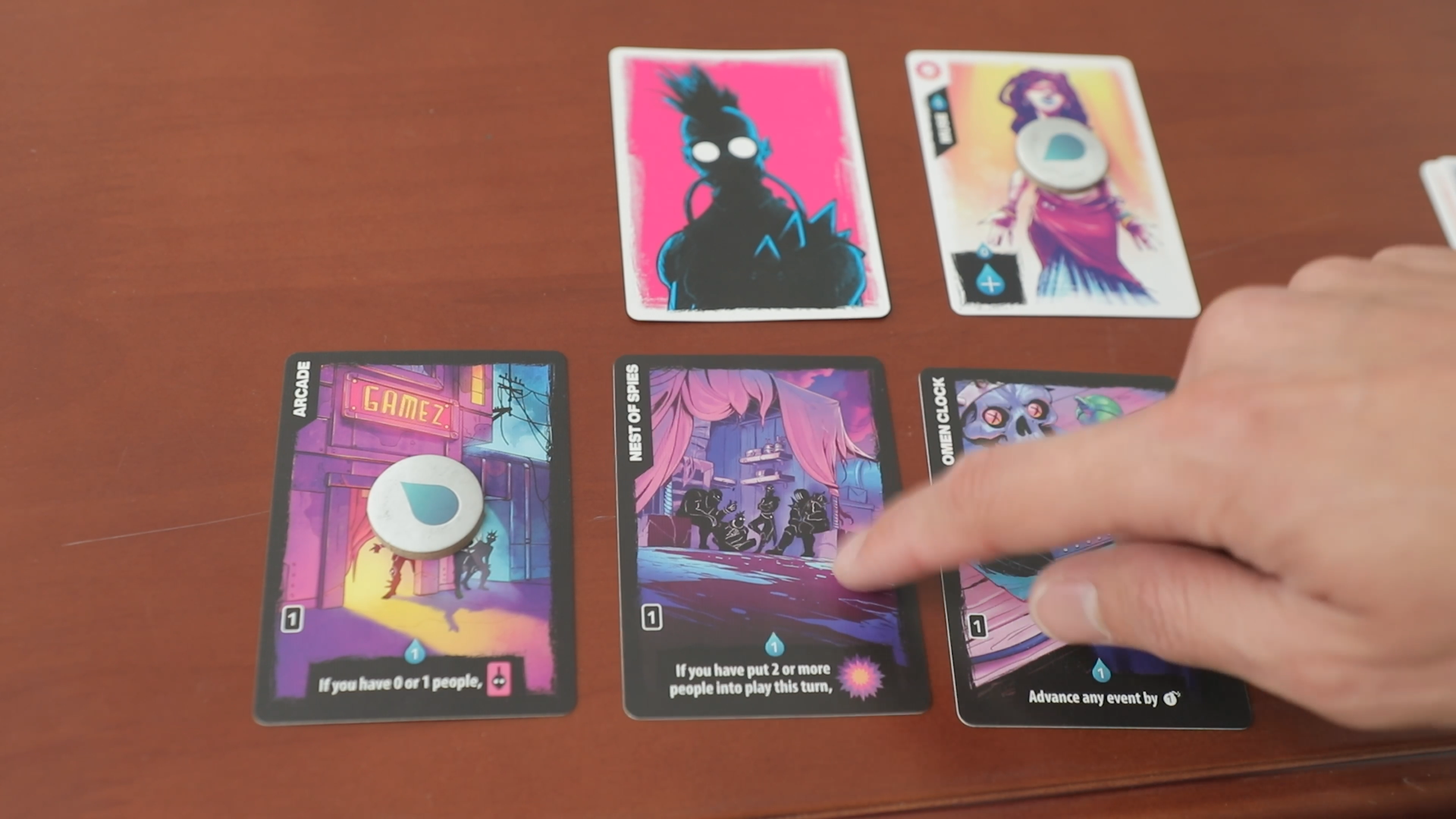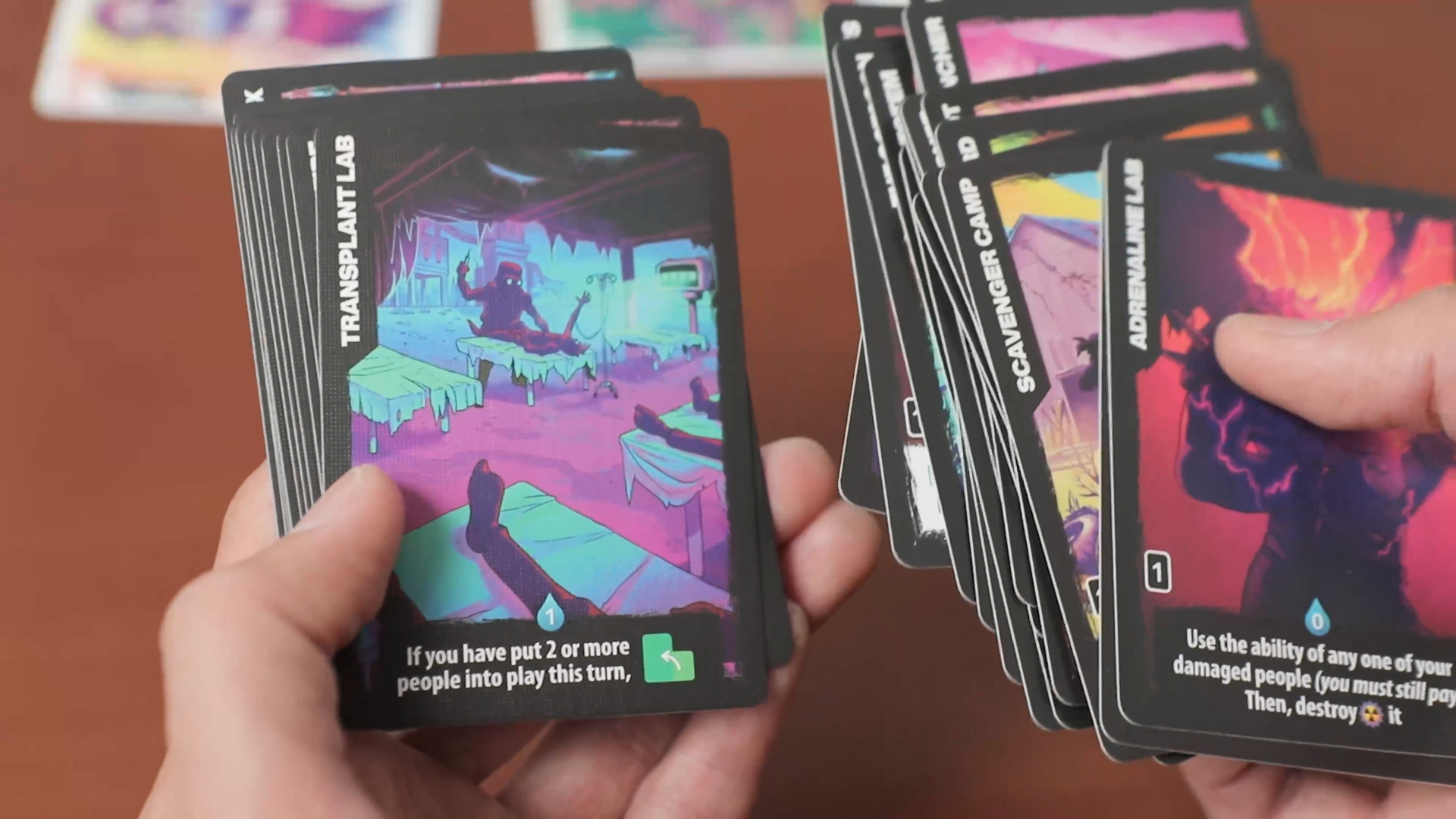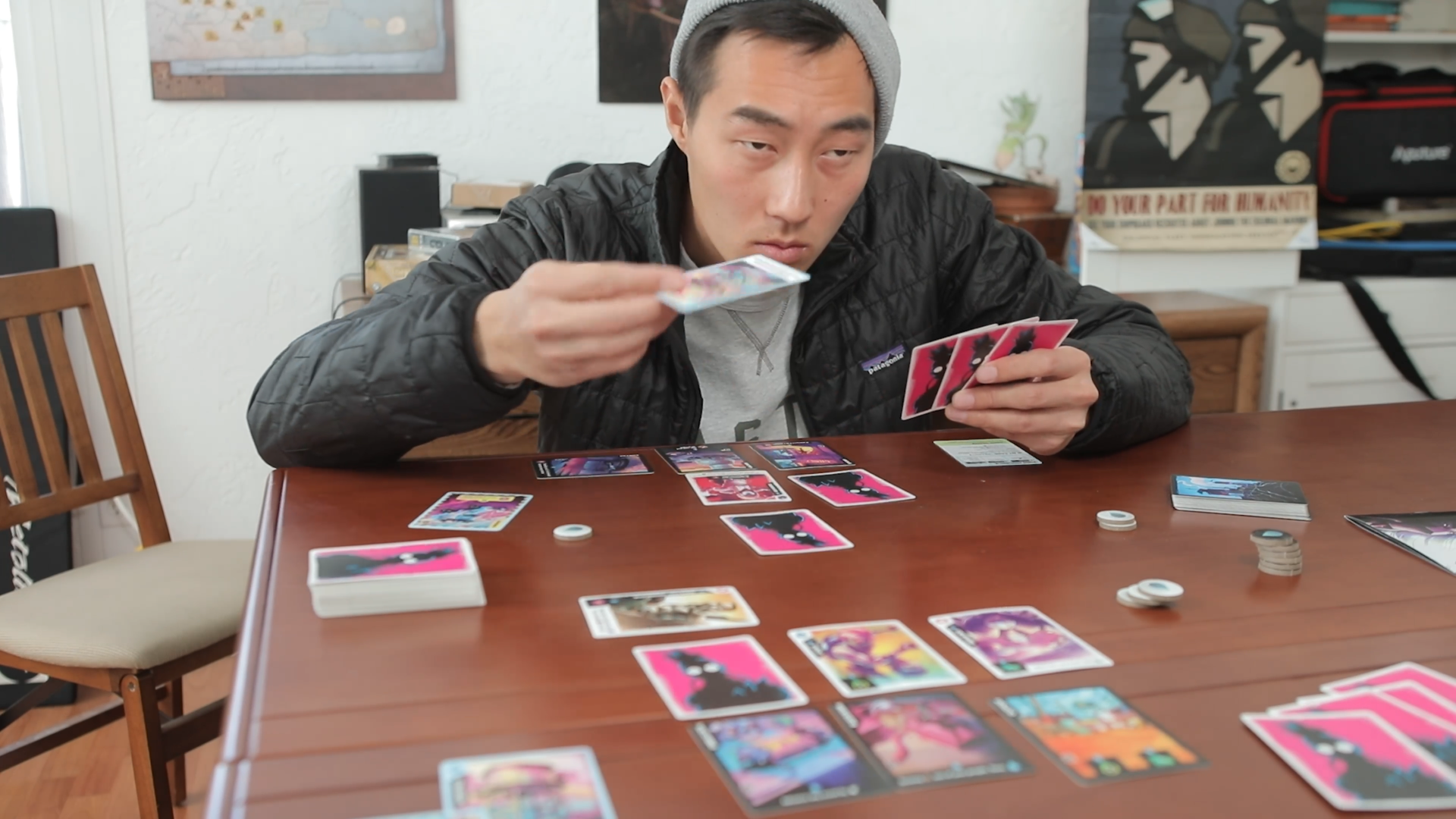Radlands Review
A semi-competitive card dueler with great accessibility.
Destroy your opponent’s 3 camps in this post apocalyptic card dueler of 20-40 minutes, managing your water resources every turn. Trigger people abilities on the board, as well as via 3 camps that give starting asymmetry.
Video published May 17th, 2022

Place people (and punks) in columns to protect each other, and your camps.

A good variety of units to trigger, just watch out for them getting damaged!

Draw 6 camps, pick 3 for your initial hand size and strategy
Overview & How to Play
Radlands is entering your kitchen table with… ONE deck of cards!
Players will both draw from a single deck, in their mission to destroy all of their opponent’s 3 Camp cards, and keep their Camps alive. On a turn, you just have 3 water, and can do actions such as:
1. Playing a card from your hand
2. Triggering an ability on your board
3. Drawing a card
4. Discarding cards for their discard ability (called Junking)
That’s really it! The 3 water never carries over between rounds, so spend! Also, People cards, or the units of Radlands, are placed in a column system, where you want to put down people directly in front of your Camps to protect them against your opponent.
In addition to the People cards who take up most of this game, there’s also Events that are placed in a side column, that then advance forward at the start of every turn. So an Event with a ‘1’ symbol on it, will trigger at the start of your next turn, if you play it now.
Pros
This little box is so well presented. Components are super high quality, including the thick cardstock for cards, even thicker water tokens, and a colorful insert. Oh, and there’s full art on all the cards! These all fit great into the included colorful insert, without a need for plastic bags to prevent things from moving around.
Accessibility continues with how Radlands is incredibly easy to teach and set up. In fact, you can get it going in minutes, as only a couple of cards need to be individually picked out to begin, and the instruction of ‘KILL OPPONENT’S CAMPS’ is quite clear. Then the included player aids can help do some lifting on the possible actions.
We definitely like how intuitive Radlands’ water system is too. You have 3 water, then go! Do whatever you want, and you don’t have to worry about certain sequencing or phases of actions. It’s very clear that there’s a tradeoff between spending for actions on the board, drawing cards, or playing cards.
There’s something called a ‘Water Silo’ that helps flesh this out, where you can spend a water now, to get a card that will give you a water later! This really smooths out water management, where if you ever have extra water, you can put a deposit in to get it back later. Or if you already have a water and the Water Silo, you can spend the Water Silo to have 2 water, which will open up possibilities, if you didn’t want to draw a card by spending 2 water.
As for the board play, there’s a neat distinction between Damaging vs. Injuring things, where Damaging is harder to get as an ability, but can actually advance your win condition of destroying your opponents Camps! Injure is easier to come by, but can’t ever touch camps.
Raiders are probably at the top of our list for mechanic praise, where you can instruct Raiders to come in as a timed event to eventually damage your opponent’s Camps! As the Raiders slowly inch towards your opponent at the start of your turns, both players can plan around that future game state of some Camp getting whacked.
For a game about card synergies, the 2 card combos definitely come in when you think of Camps. There’s a Camp where you can parachute people in, getting to use their ability right away, but then damaging them. This isn’t a concern if you can use another camp to Mulch this damaged person, letting you draw a card! Spawning Punks, or weaker token-like units on the board, has great interaction with the Camps, where one Camp will let you spawn Punks by itself! Then you can use these Punks as fuel for an actual Catapult Camp to rain down fire on your opponent!
Radlands can keep you coming back as you continue to see 6 Camps, then pick 3 of them in a total Camp deck of 36 cards. There’s just a lot to experiment with when you factor in that your Camps also determine how many cards you start the game with.
And Radlands runs very true to time at 20-40 minutes, so no worries about it clogging up your kitchen table for long!
Cons & Nitpicks
We do have concerns with Camps though, namely how they’re not balanced, making certain combinations of them a little too strong. There’s nothing here quite broken, but perhaps your opponent constantly triggering Blood Bank to destroy Punks to get an extra water every turn is stifling to play against.
Events are also slightly wacky, where there’s 0 timed Events, meaning Events that happen right away when played from a hand. This disregards the interaction of Events slowly accelerating, where players could actually play around Events! Moreso, 2 of the 0 timed Events are bonkers strong, like ‘Truce’ to return EVERY single person on the board to their owner’s hand. Or ‘Strafe’ to do up to 3 damage, at the cost of a mere 2 water. There’s no negation spells in Radlands, which makes these agonizing to have sprung on you.
More unbalance continues with People, where due to how every single Person card has 2 health, lower cost units, like ones for 1 water, are just stronger. This makes drawing expensive People, like ones with 3 water, really rough to play, where they don’t have any built in protection for them taking your entire turn to play. Radlands’ simplicity for cards backfires here, where many other card games have stats, like health, built into units, so that your investment isn’t so vulnerable.
Let’s delve deep into the ‘Junking’ mechanic here. This is where you can take an action to discard a card from your hand, getting its ability on the top left corner without spending water. This does lead to multi-card use: you can sometimes be questioning whether you should play a card, or use it to say, trigger Raiders by losing that Person card from your hand. The problem with the Junking is that it makes the game restrict card draw, or else it would be too good to stock up on cards (no hand limit in game). Restricting card draw though, ends up hurting how this game treats randomness, where it’s difficult to draw cards if you have a poor hand. What do you do if you have a bunch of expensive People, and Events that don’t give you much board advantage? Getting and keeping board advantage is so important in Radlands.
Radlands also has iconography concerns, where the current symbols are good, but we wish they included more symbols! That would help clarify cards without leaning into lots of text, on cards that already have full art. And the card names being sideways doesn’t help bring the People you’re constantly using more identity.
Final Thoughts
These all sound like really critical gripes with Radlands, but the fact is, that they don’t hurt the game that much for what Radlands is trying to be: a non-zany card game, that has competitive tempo management, with casual twists to make it highly accessible. Our personal gripes definitely have to do with how we here at Shelfside are extremely seasoned in other card games, having put in countless hours of playtime and research to get comfortable with those games. In Radlands, you can just grab a deck and go, no need to explain specific archetypes, deck strategies, etc. Just go and play!


















